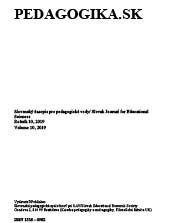Potreba kritického sociologického myslenia v učiteľských študijných programoch
The Need for Critical and Sociological Thinking in Teaching Study Programmes
Author(s): Martina KosturkováSubject(s): Sociology, Methodology and research technology
Published by: Slovenská pedagogická spoločnosť pri SAV
Keywords: critical and sociological thinking; model of writing scientific essays; content essay analysis; ability to think critical – sociological way;
Summary/Abstract: According to the vision of the World Economic Forum, one of the top capabilities of a future person is the ability to think critically. Currently, we are increasingly aware of the fact that rapid lifestyle, information overload, difficult social situations, etc. do have an influence on a decision-making ability of an individual. Teachers are no longer the main intermediaries of information and in this context their role at school is also changed. Apart from that, their role is to teach pupils to evaluate information logically in different socio-cultural contexts and to reach their decision by proving their sensitivity to a social problem. Do faculties prepare their future teachers in these dimensions? The aim of the study was to detect the level of students' ability to critically reflect on a chosen social problem. The subject of the content analysis were scientific essays (N = 207; available choice ), which were a part of the compulsory output of the social-scientific subject of the teacher study programmes within the three faculties of Prešov University in Prešov, realized in the winter semester of the academic year 2016/2017. By analyzing scientific essays, it was shown that approximately one third of students failed to apply elements of critical sociological thinking in solving a given social problem. The students´ major shortcomings were found in their lack of ability to demonstrate sensibility in specifying the thesis that we consider fundamental in relation to the need to solve a social problem and the character of the output. The mentioned lack is the result of a non – critical obtaining the enormous amount of information, the absence of systematic support for critical thinking in education, etc. The author agrees with the need for a cognitive revolution in Slovak education, which has recently been reported by Prof. Miron Zelina.
Journal: PEDAGOGIKA.SK
- Issue Year: 2019
- Issue No: 2
- Page Range: 100-126
- Page Count: 27
- Language: English

